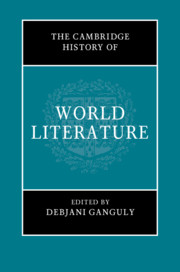Book contents
- The Cambridge History of World Literature
- The Cambridge History of World Literature
- Copyright page
- Contents
- Figures
- Contributors
- Acknowledgements
- Introduction
- Part I Genealogies
- Part II Thinking the World
- 9 Does Poetry Make Worlds?
- 10 Ecosystems of World Literature
- 11 From World Literature to World Philosophy and Back Again
- 12 Saving Europe through Weltliteratur: The Case of Victor Klemperer
- 13 Viśvasāhitya: Rabindranath Tagore’s Idea of World Literature
- Part III Transregional Worlding
- Part IV Cartographic Shifts
- Part V World Literature and Translation
- Part VI Poetics, Genre, Intermediality
- Part VII Scales, Polysystems, Canons
- Part VIII Modes of Reading and Circulation
- Part IX The Worldly and the Planetary
- Index
- References
13 - Viśvasāhitya: Rabindranath Tagore’s Idea of World Literature
from Part II - Thinking the World
Published online by Cambridge University Press: 17 August 2021
- The Cambridge History of World Literature
- The Cambridge History of World Literature
- Copyright page
- Contents
- Figures
- Contributors
- Acknowledgements
- Introduction
- Part I Genealogies
- Part II Thinking the World
- 9 Does Poetry Make Worlds?
- 10 Ecosystems of World Literature
- 11 From World Literature to World Philosophy and Back Again
- 12 Saving Europe through Weltliteratur: The Case of Victor Klemperer
- 13 Viśvasāhitya: Rabindranath Tagore’s Idea of World Literature
- Part III Transregional Worlding
- Part IV Cartographic Shifts
- Part V World Literature and Translation
- Part VI Poetics, Genre, Intermediality
- Part VII Scales, Polysystems, Canons
- Part VIII Modes of Reading and Circulation
- Part IX The Worldly and the Planetary
- Index
- References
Summary
Rabindranath Tagore’s essay on world literature, Viśvasāhitya (1907), is important not just because of the political and historical circumstances of its production, but because it advocates a method of ‘doing’ world literature that potentially frees us from the conundrums besetting the methods used so far if scholars writing on the essay were to read it for what it actually says. In this paper, the Bengali text of this essay is closely interrogated to arrive at the surprising conclusion that the idea of world literature that he arrives at in this essay, in complete contrast to Goethe’s, is not an addition of the national literatures of the world – that, he says, is a very provincial way of looking at the question. Instead, he posits here a philosophical notion related to an understanding of the self and the other which is predicated upon his inheritance of, and interest in, both Upanishadic high theory as well as popular folk culture. His concept (or anti-concept) was premised upon his advice to find the world in the self, and was one that may, perhaps, be mined for its emphasis on particularity and attention to the individual as it exists in relation to the whole.
- Type
- Chapter
- Information
- The Cambridge History of World Literature , pp. 261 - 278Publisher: Cambridge University PressPrint publication year: 2021
References
- 1
- Cited by



